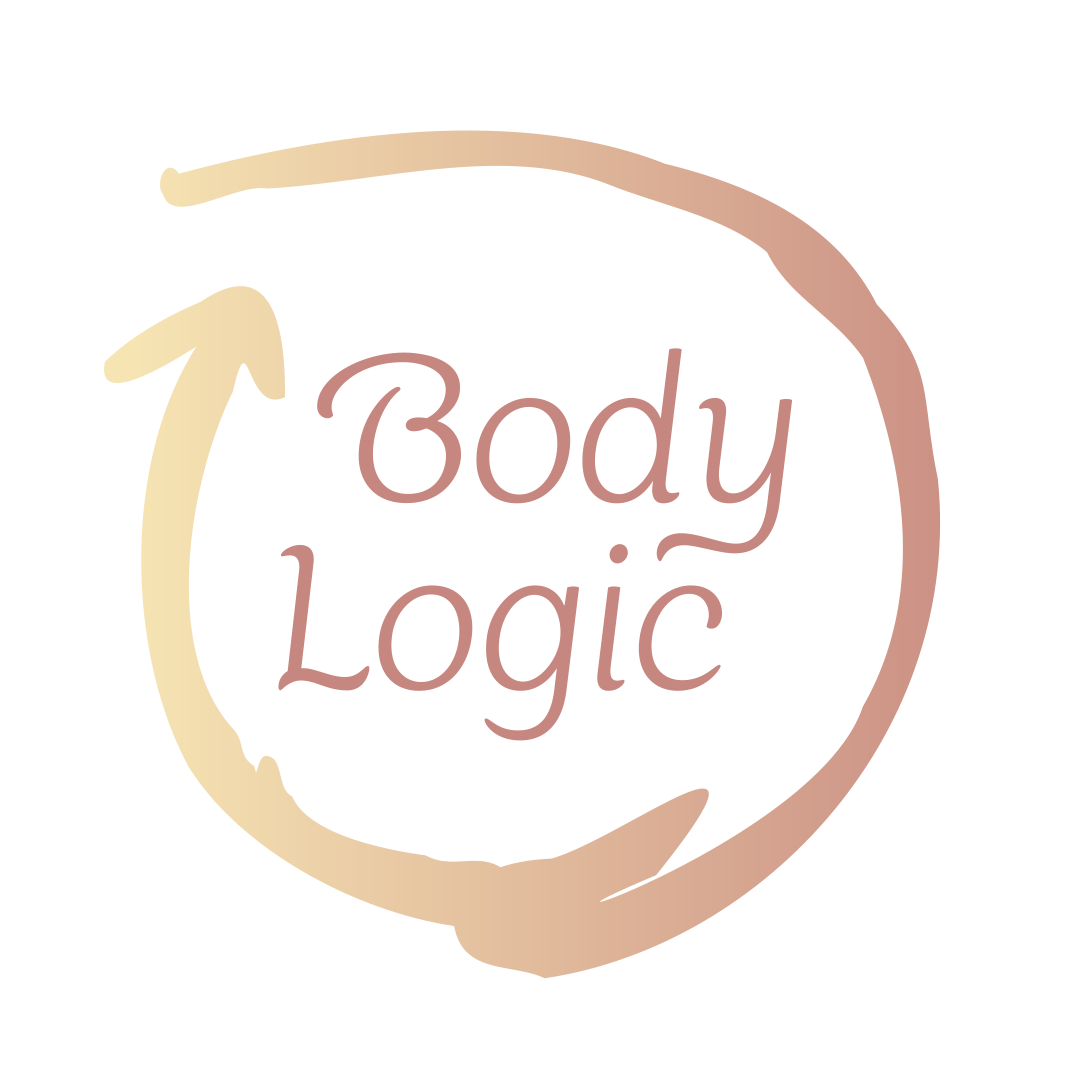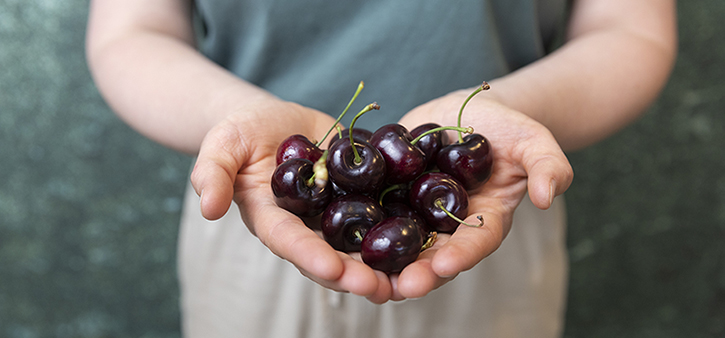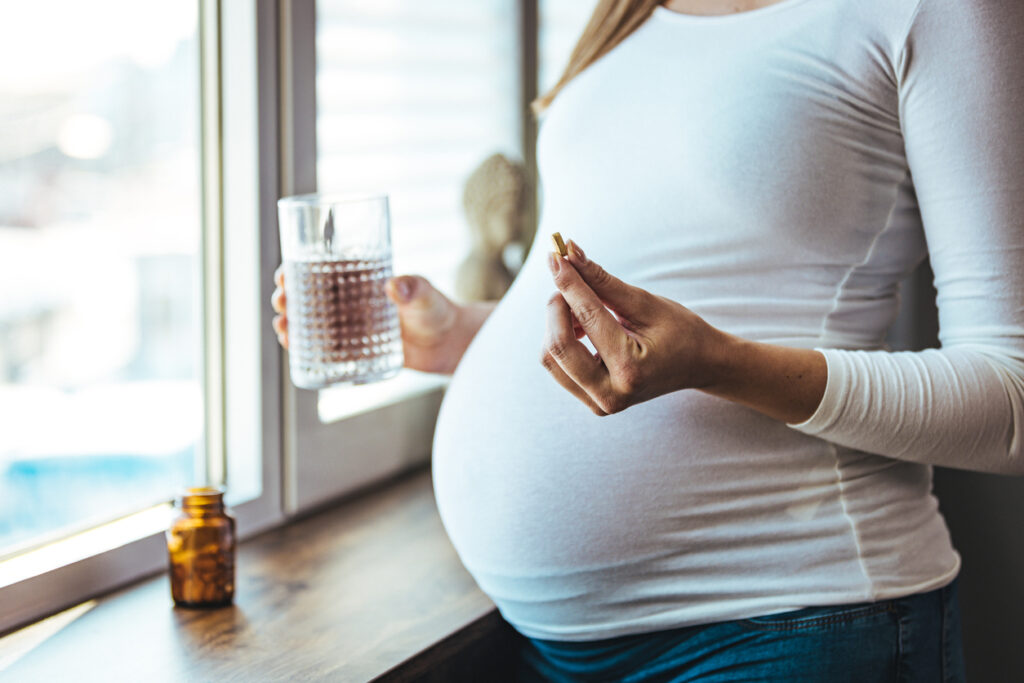
What are you taking? Half of all pregnant women take a multivitamin during pregnancy. Handy, isn't it, everything you need in one pill, including the recommended folic acid and vitamin D? Many brands recommend starting it before pregnancy and using it for a while after pregnancy too. Each brand has a slightly different composition, yet they are roughly the same on most parts. Anyway, they all contain extra iron, no vitamin A and a little bit of calcium. But is this composition really the best? Is a multivitamin wise at all? Here I zoom in on iron, vitamin A, calcium and iodine.
Iron
No woman eats enough iron. Not even when she is pregnant. So supplement it some experts say1. It is true that you need more iron during pregnancy. But that does not mean that every woman needs a multivitamin with extra iron in pregnancy.
Iron is very important. It ensures that every cell in your body gets oxygen. Oxygen cannot swim to your cells by itself. For that, it has to be carried by the molecule haemoglobin found in your red blood cells. The iron in haemoglobin makes oxygen stick. Then it can get to the right place.
In pregnancy, you need more iron, so your body makes you produce more red blood cells. This gives you more room to carry oxygen. But what increases even more than those cells is the amount of fluid in your blood. Your blood becomes thinner. And that's a good thing, because women who don't have that are more likely to have all kinds of pregnancy complications. Because your blood is thinner, it seems like there is less haemoglobin and iron in your blood, but that is because they are swimming in a larger pool of water.2
“The average Dutch woman does not need extra iron during pregnancy“
Iron deficiency anaemia
Anaemia exists when your haemoglobin is lower than normal. Every pregnant woman is tested. There may be an iron deficiency, in which case you will benefit from taking (or eating) extra iron. In some (low-wage) countries, anaemia during pregnancy is common, which is why the WHO recommends that every woman there gets about 30-60 mg of iron during pregnancy. But for the average Dutch woman, there is no evidence for this2,3. Funnily enough, only a small proportion of pregnant women here are anaemic, despite some experts claiming that every woman gets too little iron (maybe we need less after all?).
How your body ensures sufficient iron
Because iron is so important, your body has all kinds of ways to hold on and recycle iron properly. When you're pregnant, you no longer lose blood every month - that's a bit of iron you don't lose in any case and therefore don't need to take 'extra'. You also get good at absorbing iron from food. Your intestines never absorb everything in your food. It could be that before pregnancy you only absorbed about 10% of the iron in apple syrup, but during pregnancy that doubles. Smart isn't it? The large amounts of oestrogens flooding your body make your intestines absorb iron much easier.
Do you still get too little iron? At first your iron supply will slowly drops. This signals your body to perform even better at absorbing iron. You might even achieve an intake of 40%4! If there is still too little iron coming in then, and only then, you get anaemia.
Fatigue due to iron deficiency
But I'm so tired, aren't I? Fatigue is common during pregnancy, but strangely enough, this has no obvious relationship with your haemoglobin. If you feel better after taking iron supplements, this could very well be a placebo effect2.
The consequences of taking too much iron
Just in case? Just taking iron without needing it is not 'if it doesn't help, it won't hurt'. Iron affects the absorption of other minerals, such as copper and zinc5. Fortunately, most multivitamins also contain zinc and copper. But copper, for example, is not in Essential Organics®'s multi even though it contains the most iron. There is also some evidence that taking extra iron may lead to more frequent jaundice in the newborn8,9. This can lead to anxiety and blood drawing in your newborn baby.
Iron and free radicals
Too much iron causes the formation of free radicals. These free radicals damage cells. This also happens in pregnant women, research by Rajendran shows6 and colleagues. Their study shows that taking extra iron in pregnancy - when you are not anaemic - is potentially harmful. It leads to the formation of free radicals and an increase in inflammatory levels. Free radicals are also seen in preeclampsia. Possibly extra iron there increases the risk of preeclampsia.7. Women in this study took 200 mg of iron every day out of 12ththe to the 28thste week. In women who were anaemic and took iron, inflammation levels decreased. Multivitamins do contain less iron (between 14 and 20 mg), but increasingly in a more absorbable form. And often women take them throughout pregnancy and breastfeeding.
Extra iron is usually not needed in pregnancy
Much attention has been paid to anaemia in pregnant women, but much less to the effects of extra iron in healthy pregnant woman. A multivitamin containing 100% of the recommended amount of iron is not necessary for most women in pregnancy. My advice? Eat beef, eat mussels and other rich sources of iron. And drink fresh orange juice with plant sources of iron. Take extra iron only if there is a good reason to do so.
Vitamin A
Do you ever eat liver? Most women have not grown up with it and so are not used to the taste. At most, we sometimes eat a piece of liver pate or sausage. During pregnancy, we are afraid of it. But is this justified?
Beta-carotene and retinol
Vitamin A exists as preformed vitamin A, also called retinol. Of the precursor forms, beta-carotene is the best known. Retinol is found only in animal products: think dairy, eggs, butter and liver10. The animal (thank you cow!) has already converted beta-carotene into retinol. Beta-carotene is abundant in fruits and vegetables. It is converted slowly and to a limited extent in our bodies to vitamin A. You need about 12 micrograms of beta-carotene to make 1 microgram of retinol. Therefore, too much retinol by eating too much beta-carotene does not occur. (Although eating too much beta-carotene can cause your skin to turn orange...) So why is there no retinol in a multivitamin for pregnant women? Too much retinol can potentially cause birth defects in the first trimester. But beware: too little retinol can also cause congenital defects.
The need for retinol during pregnancy
What you need at least in pregnancy is 750 micrograms of retinol per day. If you are breastfeeding, you need as much as 1,100 micrograms. The majority of women have trouble meeting those numbers. Do you eat entirely plant-based and get no retinol? Then you theoretically need 750 * 12 = 9,000 micrograms of beta-carotene (assuming you can convert all this properly). A multivitamin for pregnant women contains around 750 micrograms of beta-carotene. Far too little in that case.
"Why don't we see liver in a positive light? With just a little bit of liver (pâté), your vitamin A is up in no time!"
A safe upper limit for retinol
The European Food Safety Authority has set a maximum upper limit of 3,000 micrograms per day for retinol. That is on the safe side. A small piece (20 grams) of calf's liver will indeed get you there. Hence, only a bit of liver pate is advised. But why don't we see liver in a positive light? With just a little bit of liver, your vitamin A is up in no time!
That 3,000 micrograms is prudent and more than double is probably okay too4,11. The caution with vitamin A started with the experiences with synthetic vitamin A. Taking this synthetic form of vitamin A in the first trimester has a very high risk of congenital anomalies (about 25%!). Extrapolate those worrying findings to retinol and naturally - with very little evidence otherwise - you get a very cautious upper limit.
During pregnancy, be sure to eat some animal sources of vitamin A too. In that case, you don't need the beta-carotene found in a multivitamin at all. If you eat only plant-based foods, consult with a dietician.
Calcium
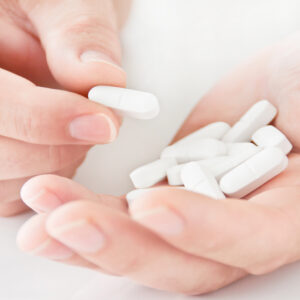
Just try swallowing a big rectangular pill. Pretty tricky right? But the smaller the pill, the less calcium it contains. Calcium takes up an awful lot of space. Instead of milligrams, you need a whole gram of it. This is why most multivitamins for pregnant women do not contain enough calcium12, because it doesn't swallow so well.
Yet there is a lot to be said for calcium. You need more in pregnancy and especially if you are breastfeeding. And there is strong evidence that more calcium (an extra half a gram to 2 grams) increases foetal birth weight and reduces the risk of all kinds of complications, including preeclampsia. Half of all pregnant women get less than a gram from their diet. One litre of milk contains more than a gram of calcium. But show me a woman who drinks real milk these days.
"Half of pregnant women don't get enough calcium"
Consequences of too little calcium in pregnancy
If you don't eat enough calcium, you have a big reserve in your body: your bones. They contain about 1 kilo of calcium. So in theory, there won't be too little calcium for your child or for you. But better not count on your bones. It is stressful for your body to extract calcium from your bones. There are side effects involved.
As soon as you eat too little calcium, the parathyroid hormone is switched on. Also known as PTH. It causes calcium to be released from your bones and into your blood. One drawback is that PTH inhibits your metabolism and contributes to inflammation. Could that perhaps explain the relationship with preeclampsia? If you don't take dairy, chances are you are not getting enough calcium and you need an extra supplement. What do you prefer? A big rectangular pill every day or a few servings of dairy?
Iodine
Iodine is an important building block for the thyroid hormone. Which in turn is important for the entire development of your unborn child. A deficiency leads to problems, but so does a surplus. During pregnancy, you need 200 microgrammes of iodine a day. An iodine deficiency is not very common in the Netherlands. An iodine excess is probably much more common. Yet you will find 100% of the daily allowance in most multivitamins for pregnant women. This is often not necessary.
Iodine is not only added to all bread (unless you bake it yourself or get it from an artisan bakery), but is also found in fish, dairy, eggs and many kinds of salt. Do you incorporate all these foods in your diet? Then your multivitamin may be giving you an overdose of iodine.
Too much iodine
I tested my iodine intake in Mijn Eetmeter (a Dutch food dairy app) from the Dutch Nutrition Centre. With 3 glasses of milk, a small bowl of yoghurt, some cheese, a piece of cod, four slices of bread and some iodised salt, I already reached 540 micrograms. That's only 60 micrograms below the safe upper limit of 600 micrograms! Not even counting a multivitamin. With such a diet, a multivitamin with iodine is not necessary in pregnancy. It will give you an overdose of iodine. Your thyroid gland and that of your child is not happy about that. It may also give a higher risk of thyroiditis after pregnancy13.
Too little iodine
Only if you eat gluten-free, dairy-free or fish-free do you risk iodine deficiency. If so, an iodine supplement is vital. Is only one category missing from this list? Then you can compensate by eating more of the other foods. For example, four glasses of milk and an egg daily and a piece of fish every week will give you more than enough iodine. So you don't necessarily need to eat bread. By the way, seaweed is not really a reliable (read: good daily) source of iodine. The content varies too much and is sometimes very high.
Conclusion
A multivitamin may feel nice, but it is definitely not necessary in pregnancy. Almost all of them contain too little calcium, no vitamin A but beta-carotene, and often unnecessarily high amounts of iron and iodine. Precisely because they try to capture everything in one pill, a multivitamin is not really optimal for anyone. Rather, invest in eating real food.
You won't find the best supplements on the vitamin shelf. Dairy, eggs, a little calf's liver, fish and other seafood contain an awful lot of different nutrients. If you add them all to your diet - along with plenty of plant products - you don't have to worry about whether you're getting enough of any particular substance. Still not sure? Are you a vegetarian or vegan, or do you dislike dairy and fish? In that case, it is better to take separate combinations or consult your midwife, doctor or dietician.
References
1. Elion-Gerritzen WE, Giordano PC, Haak HL. De standaard "Anemie in de eerstelijns verloskundige praktijk" van de Koninklijke Organisatie van Verloskundigen (KNOV): risico voor het niet onderkennen van ijzergebrek en hemoglobinopathie. NTVG 2002;146:457-459.
2. KNOV Standaard. Anemie in de Verloskundige Praktijk: Aanbevelingen voor Preventie, Diagnostiek en Behandeling. 2010
3. Linden MW. Ijzerpreparaten bij ijzergebreksanemie. Geneesmiddelenbulletin. 2009;43(2):13-18.
4. The Nutrition Society. Introduction to Human Nutrition. Second Edition. (Gibney M, Lanham-New S, Cassidy A, Vorster H, eds.). Wiley-Blackwell; 2009.
5. Ziaei S, Janghorban R, Shariatdoust S, Faghihzadeh S. The effects of iron supplementation on serum copper and zinc levels in pregnant women with high-normal haemoglobin. International Journal of Gynecology and Obstetrics. 2008;100(2):133-135. doi:10.1016/j.ijgo.2007.07.026
6. Rajendran S, Bobby Z, Habeebullah S, Elizabeth Jacob S. Differences in the response to iron supplementation on oxidative stress, inflammation, and haematological parameters in nonanaemic and anaemic pregnant women. Journal of Maternal-Fetal and Neonatal Medicine. 2022;35(3):465-471. doi:10.1080/14767058.2020.1722996
7. Rayman MP, Barlis J, Evans RW, Redman CWG, King LJ. Abnormal iron parameters in the pregnancy syndrome preeclampsia. Am J Obstet Gynecol. 2002;187(2):412-418. doi:10.1067/mob.2002.123895
8. Moghimi MA, Malekzadeh J, Moghimi M. An assessment of the relationship between maternal iron supplementation and hyperbilirubinemia in neonates: a nested case-control study. International Journal of Advanced Biotechnology and Research (IJBR). 2017;8(4):1573-1578.
9. Alizadeh L, Salehi L, Mehraban Z, Ramzi M. Effect of iron supplementation in pregnant women with high haemoglobin on neonatal jaundice: a randomised double-blind clinical trial. The Iranian Journal of Obstetrics, Gynecology and Infertility. 2019;22(4):18-24.
10. Nutrition Centre. Vitamin A . Accessed November 13, 2023. https://www.voedingscentrum.nl/encyclopedie/vitamine-a
11. Wiegand UW, Hartmann S, Hummler H. Safety of vitamin A: recent results. Int J Vitam Nutr Res. 1998;68(6):411-416.
12. Maastricht UMC+. Te weinig calcium in multivitaminen voor zwangeren. Published March 1, 2019. Accessed November 21, 2023. https://www.mumc.nl/actueel/nieuws/te-weinig-calcium-multivitaminen-voor-zwangeren
13. Manousou S, Johansson B, Chmielewska A, et al. Role of iodine-containing multivitamins during pregnancy for children's brain function: Protocol of an ongoing randomised controlled trial: The SWIDDICH study. BMJ Open. 2018;8(4). doi:10.1136/bmjopen-2017-019945
